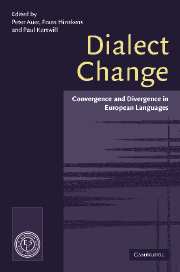Book contents
- Frontmatter
- Contents
- List of maps
- List of figures
- List of contributors
- Preface
- Map
- 1 The study of dialect convergence and divergence: conceptual and methodological considerations
- Part 1 Convergence, Divergence and Linguistic Structure
- 2 Internal and external factors in phonological convergence: the case of English /t/ lenition
- 3 Dialect/standard convergence, mixing, and models of language contact: the case of Italy
- 4 Convergence and divergence in grammar
- 5 Phonology, grammar, and discourse in dialect convergence
- Part 2 Macrosociolinguistic Motivations of Convergence and Divergence
- Part 3 Microsociolinguistic Motivations
- References
- Index
4 - Convergence and divergence in grammar
Published online by Cambridge University Press: 22 September 2009
- Frontmatter
- Contents
- List of maps
- List of figures
- List of contributors
- Preface
- Map
- 1 The study of dialect convergence and divergence: conceptual and methodological considerations
- Part 1 Convergence, Divergence and Linguistic Structure
- 2 Internal and external factors in phonological convergence: the case of English /t/ lenition
- 3 Dialect/standard convergence, mixing, and models of language contact: the case of Italy
- 4 Convergence and divergence in grammar
- 5 Phonology, grammar, and discourse in dialect convergence
- Part 2 Macrosociolinguistic Motivations of Convergence and Divergence
- Part 3 Microsociolinguistic Motivations
- References
- Index
Summary
Introduction
This chapter offers an overview of the most salient current frameworks for analysing processes of convergence and divergence cross-dialectally (including those which occur between standard languages and related dialects) at the grammatical level. It also develops the view expressed in Wilson and Henry (1998) and Kallen (this volume) that combining insights from various models can enhance our understanding of the mechanisms of linguistic variation and change. The paradigms in question are the so-called ‘generative’ programme of Chomsky (1995) and the ‘variationist’ approach of Labov (1994). The emphasis in the former on ‘top-down’ theories of language has led to its being described as an ‘Internalist’ framework that conceives of ‘Grammar’ as having no external existence. This perspective is, however, contested by variationists, who have developed a ‘bottom-up’ or ‘Externalist’ model which takes ‘Grammar’ to be a product which is primarily socio-cultural rather than biological. Consequently, each framework operates distinctive methods of analysis and the object of study in typical investigations which rely on these models is also markedly different. Variationists, for example, emphasise the systematic recording and analysis of socially situated language samples with due regard for the so-called ‘observer's paradox’ and the unreliability of speaker-judgements (cf. Bell 1984; Giles 1984; Labov 1975, 1996; Le Page 1997; and Trudgill 1986). This type of research often focuses on speakers of non-standard dialects who are in contact with others in their community using a standard variety with much greater social prestige.
- Type
- Chapter
- Information
- Dialect ChangeConvergence and Divergence in European Languages, pp. 96 - 134Publisher: Cambridge University PressPrint publication year: 2005
- 12
- Cited by



